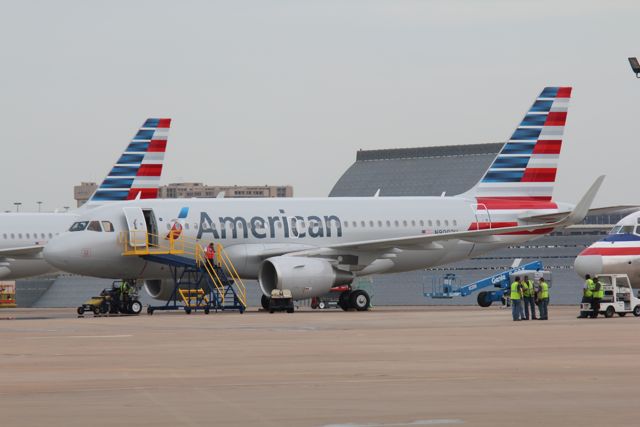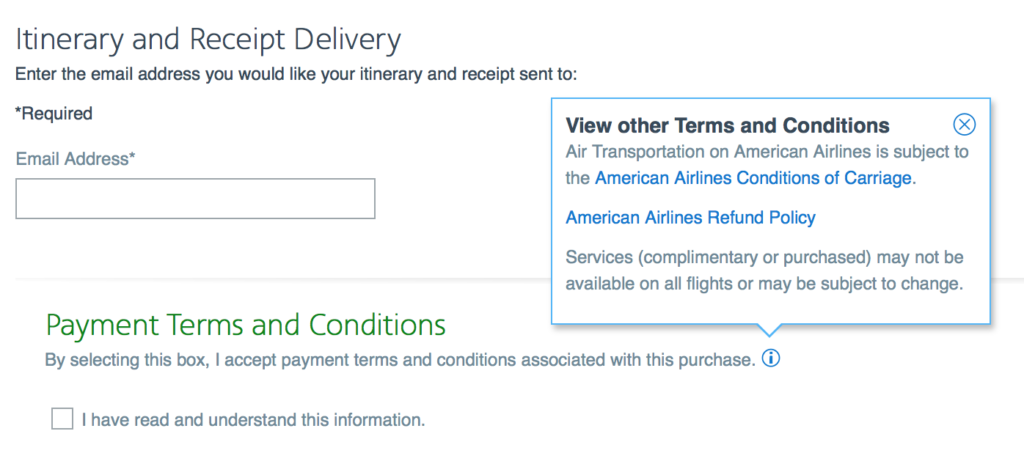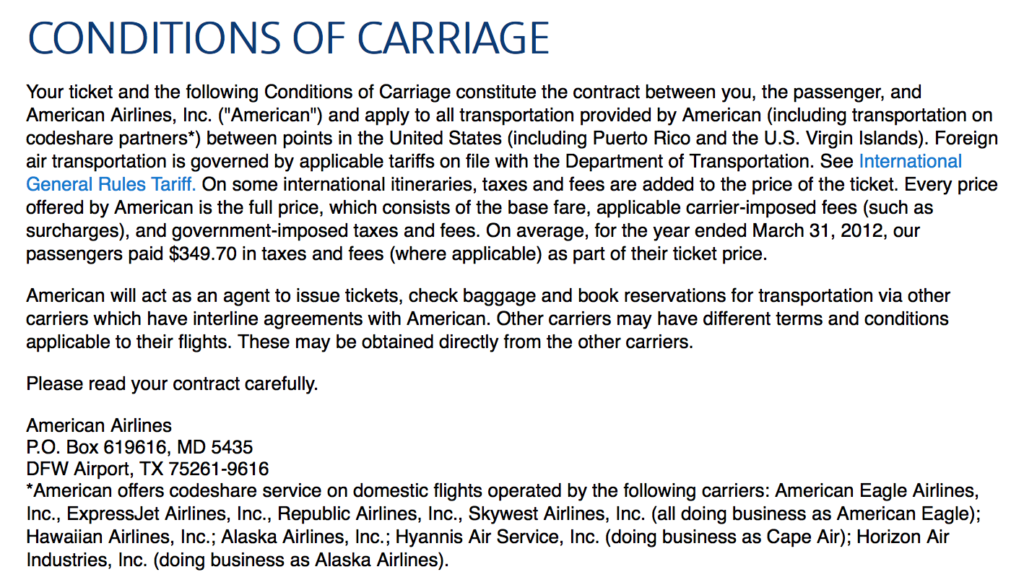
American Airlines will honor all ~$450 business class fares to Beijing that were ticketed during a short window on Tuesday evening in which base fares ranged from $0 to $20 (the rest of the $450 fare was government taxes and a $300 fuel surcharge). At the same time, AA swiftly voided all reservations that were held but not ticketed on AA.com. Does this action run afoul of the U.S. DOT mandate against post-purchase price increases, DOT requirements to allow 24-hour holds or cancellations, and AA’s own Conditions of Carriage? I will argue the answer is no.
AA’s Logic in Canceling Held Reservations
In an internal memo, AA reasoned it would cancel unticketed $0 base fares because “Rule 5 states we do not intend to publish zero dollar fares.” Just what is Rule 5? Rule 5 is part of AA’s International General Rules published here on aa.com. The pertinent part states–
(J) MISFILED FARES
AA, as a policy, does not file nor intend to offer/file fares priced at zero (exclusive of any surcharge). Essentially, such fares do not make any economic sense. AA has introduced warning mechanisms to try to prevent such occurrences; however, occasionally fares such as these mistakenly get loaded into computer reservation systems that are not controlled by AA. Agents/customers should be aware that in these circumstances they are not allowed to ticket at these fares and AA will not honor fares of zero (exclusive of any surcharge). In the event that a zero fare (exclusive of any surcharge) is ticketed inadvertently, AA will void such ticket and may choose to waive, in its sole discretion, certain rules or restrictions of existing published fares as a gesture of good will.
Ah! The smoking gun. Note my bolding above.
But is this “International General Rules” different than AA’s Contract of Carriage? Yes and no.
When you buy a ticket on aa.com, you come to this screen on the final payment page–

In order to purchase a ticket, you must agree to “the terms and conditions associated with this purchase” which include a link to AA’s Conditions of Carriage.
Within AA’s Condition of Carriage is the link to the International General Rules Tariff with a reference to its applicability on international reservations.

Thus, by purchasing a ticket through aa.com you are agreeing to AA’s unequivocal statement that it will not honor zero dollar fares.
Case closed? Not quite.
AA’s Own Conditions of Carriage Pledge to Honor Held Reservations
AA’s COC also states–without any caveat–that it will honor held reservations.

How does that reconcile with Rule 5 above? It does not — it cannot.
Thus, we are left in a land of uncertainty.
14 CFR 399.88 (Prohibition Against Post-Purchase Price Increase) is Not Applicable
Some have argued that the DOT’s mandate against post-purchase price increases is applicable here, but held fares are not purchased fares — 14 CFR 399.88 only becomes applicable once a fare is purchased (not ticketed, merely purchased, defined by the DOT as follows: “A purchase occurs when the full amount agreed upon has been paid by the consumer. Therefore, if a consumer purchases a fare and that consumer receives confirmation (such as a confirmation email and/or the purchase appears on their credit card statement or online account summary) of their purchase, then the seller of air transportation cannot increase the price of that air transportation to that consumer, even when the fare is a “mistake.”)
Put simply, a held fare is not a purchased fare (even though a confirmation e-mail is generated when fares are held) and thus 14 CFR 399.88 is not applicable.
14 CFR 259.5-6 (Mandatory 24-Hour Holds or Cancellations) May be Applicable
This rule “requires carriers to hold a reservation at the quoted fare for 24 hours without payment or allow a reservation to be cancelled within 24 hours without penalty.”
Seems clear-cut: either AA allows you to cancel within 24 hours or guarantees your fare for 24 hours (as its own COC promises). AA’s decision to allow 24 hour holds instead of cancellations is not dispostive, for the two choices are functionally equivalent, both essentially giving a consumer 24 hours to consider a guaranteed fare price.
Only they are actually not equivalent.
While the DOT requirements in 14 CFR 259.5-6 appear primarily aimed at empowering risk-free cancellations, note the language — AA must only hold a reservation at the quoted fare…it is not compelled to ticket it. A narrow distinction, but an important one nonetheless.
So hear me out hear: the DOT rationale for this rule is, “The Enforcement Office considers the 24-hour reservation requirement to be an integral component of each carrier’s cancellation policy.” This rule is about giving you the chance to change your mind — not about allowing you to ticket something the carrier never intended to offer in the first place.
The ramifications are dangerous: AA (unique among U.S. carriers in allowing a hold instead of a 24-hour cool-off after paying) can technically get away with bait and switch, luring you in with a cheap held fare but then refusing to ticket it later on if it deems the fare erroneous. How? Because you have the option to cancel without penalty throughout the entire process and the post-purchase price increase does not kick-in until after confirming the reservation.
In many areas of law aimed at consumer protection, you cannot waive your rights. Thus, if AA said “by booking through aa.com you waive your right to protest against a post-purchase price increase” such a provision would be null and void in the contract formed between you and the carrier when purchasing a ticket.
So why isn’t AA’s Rule 5 just an illegal dodge of 14 CFR 259.5-6 and 14 CFR 399.88?
Because you are not waiving any protected right by agreeing that AA will not honor $0 fares prior to purchase. You take a risk when you hold fares, ensuring that you can cancel without penalty but not protecting yourself against unilateral cancellations by the airline for alleged mistakes.
My Take: You Waive Your Right to Ticketing When You Hold A $0 Fare on aa.com
While the who idea of a $0 fare in this case is ridiculous (as if the $300 carrier surcharges was not part of the fare), for the reasons noted above I submit that AA will prevail in a legal battle over the reach of 14 CFR 259.5-6, specifically whether AA must honor erroneous fares that were placed on hold but not paid for.
If this is battle is fought based upon traditional contract law principles rather than the verbiage of DOT regulations, a court may well side with the consumer based upon AA’s unequivocal promise to hold fares. The more likely outcome, though, is that a court would weigh AA’s promise to hold fares (implying agreement on a price) against its equally clear statement that it would never intend to offer $0 fares — ultimately finding that AA’s unambiguous wording formed a basis for the contract and that barring contrary evidence, the contract is void for a fundamental consideration — the ability to make money and thus for both sides to benefit — is not present.
Note I am only talking about $0 fares — not fares that were above $0, even if ever so slightly. Check out more on this from Rocky and Kyle.
The Solution? Ticket AA Mistakes on OTAs that Allow 24+ Hour Cool-Offs
I booked my ticket on Orbitz, for I knew it would ticket immediately and also provide me until 11pm ET the following day (roughly 27 hours after booking). I could be wrong in my legal analysis above, but why even take the risk? Next time a mistake fare comes up on AA, ticket it with Orbitz, Expedia, Or Travelocity which gives you a day to cancel while also prohibiting AA from cancelling a held reservation on controversial, yet legally sound grounds.




Matt,
I definitely agree about the zero dollar base fares, however anything above $0 should be required by the DOT to be honored. Just yesterday AA offered $2 base fare to Stockholm and Copenhagen and those were not mistake fares. Even my fare to GOT over memorial day has a $2 base fare. Point is if AA is selling $2 base fares, there’s no reason that a $20 or $40 base fare would be erroneous
“AA must only hold a reservation at the quoted fare…it is not compelled to ticket it.”
If I were an AA lawyer, I could not argue this theory with a straight face. It is ludicrous. “Yeah, we guarantee to hold that reservation for you — but we don’t guarantee we’ll ticket it.” C’mon. That’s silly. Especially when AA’s website explicitly states that your reservation is guaranteed for 24 hours.
My holds were not $0 fares but $20 fares and were not honored.
I do not think AA complying with DOT rules on this.
@Rocky: I certainly agree — even a $2 fare should be honored without question.
@Iahphx: I would never call it a compelling legal argument on the part of AA, but I think it is the winning one, especially if DOT regs are not implicated
@Clibrun: I agree.
I’m not a lawyer, nor do I play one on TV, but wouldn’t AA’s decision to honor $0 ticketed fares, notwithstanding the International General Rules stating that they never intend to offer a zero fare, render the defense you are proposing moot? Can you on the one hand claim that you have the right to not ticket a held reservation on a base fare that violates the General Rule, but on the other hand honor paid reservations made at that same improper fare? Doesn’t seem right to me.
AA might honour these fares but does it have to grant mileage for them? Is it possible post-purchase to ascribe a fare class that makes them ineligible for mileage (in AAdvantage or any other OW program) and upgrading? Not to mention being the first to be bumped down to coach if J is oversold (which AA can easily manage).